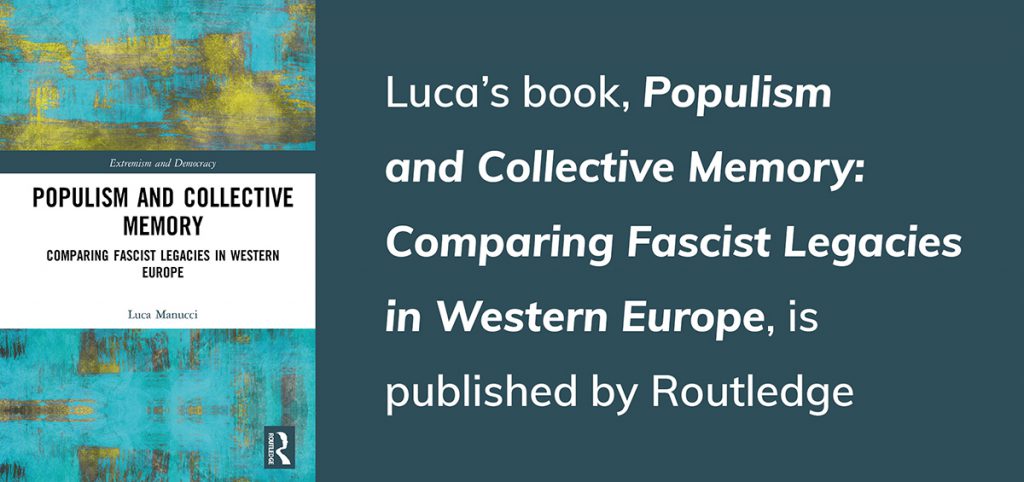Luca Manucci, in a panoramic survey of the rise of illiberalism in our times, argues that this trend is feeding on authoritarian historical legacies and memories which are being rewritten before our eyes. It is an exercise all democrats should challenge, and resist
The fascist past is haunting contemporary democracies. Fascism, in its historic form of jackboots and salutes, survives mainly as a folk gathering of nostalgic people. Contemporary far-right leaders, parties and movements tend to coexist with democratic procedures and rarely resort to structural violence. However, their nationalist – often populist – discourses and actions place liberal democracy in danger.
The assault on Capitol Hill shows how disregard for democratic principles, and widespread conspiracy theories, can trigger a coup
The assault on Capitol Hill in the United States perfectly illustrates how a growing disregard for democratic principles combined with widespread conspiracy theories can trigger an attempted authoritarian coup. Fascism and authoritarian populism are not the same but learning about the former can protect liberal democracy from the latter. The current resurgence of authoritarian and nationalistic discourses forces us to engage in important work of historic and civic education to make sure that democratic values hold firm.
Between 2016 and 2019, I wrote a book entitled Populism and Collective Memory: Comparing Fascist Legacies in Western Europe. While I was working on it, democratic values deteriorated across the world. Even countries that historically proved to have dealt with their past in a responsible and proper way, such as Germany, face serious challenges.

In 2019 the city of Dresden – birthplace in 2014 of anti-Islam and xenophobic movement Pegida – declared a 'Nazi emergency'. The entire region, Saxony, is now a stronghold of the far-right Alternative für Deutschland (AfD). Moreover, neo-Nazis started disrupting guided visits to former concentration camps. Germany, the country whose language has two different concepts for ‘dealing with the past’ – Vergangenheitsbewältigung (coming to terms with the past) and Aufarbeitung der Vergangenheit (working through the past) – is facing its own ghosts.
In Eastern Europe, selective amnesia is a common tool for dealing with the past. Hungary is trying to rewrite its history by erasing its communist past and celebrating its authoritarian interwar 'golden age'. Miklós Horthy, much glorified by Prime Minister Viktor Orbán, was a right-wing autocrat. He was also an ally of Hitler, and allowed the mass deportation of Hungarian Jews to death camps. In 2014 the Hungarian government decided to erect a memorial to commemorate the victims of the German occupation. By so doing, they communicate the historically inaccurate message that Hungary had no culpability in the Holocaust.
Hungary is trying to rewrite its history by erasing its communist past and celebrating its authoritarian interwar 'golden age'
Until the Law and Justice / Prawo i Sprawiedliwość party took power in 2015, Poland was often considered a success story of post-communist transformation. But its parliament tried to criminalise the false attribution to Poland of crimes committed by Nazi Germany during the Holocaust, promoting a vision of Polish citizens as victims or heroes, never as perpetrators. The president eventually made a partial U-turn, but only after an outpouring of antisemitic rhetoric in the Polish political debate.
Southern Europe is also facing frequent 'irruptions' of memory. Spain finally removed Francisco Franco’s remains from the mausoleum in the Valley of the Fallen, following a long legal battle. Prime Minister Pedro Sánchez took the initiative, claiming: 'no democracy can allow for monuments to exalt a dictatorship.' Meanwhile, Vox – a Franco-nostalgic party – was the third most voted-for political force in Spain's November 2019 elections.
Italy is a prime example of how not to come to terms with the past. In May 2019, far-right Lega leader Matteo Salvini chose to give a speech from the same balcony in Forlì used by Benito Mussolini, facing a square from whose lampposts the fading regime hung four partisans in 1944. Meanwhile, politicians are discussing the opportunity to open a controversial museum about fascism in Predappio, birthplace of Mussolini.
And in Portugal there have been debates around the idea of opening a museum dedicated to former dictator António Salazar near his birthplace in Santa Comba Dão. Chega, the far-right party of André Ventura, is growing and recently gained its first seat in parliament.
Authoritarianism is haunting other parts of the world, too. In Latin America, echoes of former authoritarian regimes continue to reverberate.
In Chile, for example, protests in 2019 brought back vivid memories of the authoritarian past. Repression imposed by president Sebastián Piñera invoked 'the last phase of dictatorship under Augusto Pinochet.'

In Brazil, Jair Bolsonaro dared to commemorate the 1964 military coup, and to praise torturers. His culture secretary Roberto Alvim even quoted Nazi propaganda minister Joseph Goebbels.
Each case indicates a shift in public perceptions and in 'what can be said and done'. Each is an example of a line being crossed, and the normalisation of authoritarian discourse. Across Europe and the US, Covid-19 protesters are comparing government vaccination efforts with Nazi atrocities.
Across Europe and the US, Covid-19 protesters are comparing government vaccination efforts with Nazi atrocities
However, it is by joining all the dots together that the image becomes particularly gloomy. Remembrance of WWII barbarities and the Holocaust seem to become an empty ritual, while democracies face challenges for which they are ill equipped. The media, as well as academia and civil society, must remain free to ensure the national collective memory deals with uncomfortable truths. The people in power must not ‘cut and paste’ history to provide founding mythologies prêt-à-porter.
Historical awareness is disappearing. It is therefore more important than ever to make sure we pass on our knowledge and our memory to new generations, in the hope that they will aspire to new forms of politics.
Illiberal democracy looks too similar to a past we cannot afford to repeat. If we want to realise a democratic future, we must first deal with the legacies of our authoritarian past.
This article is the first in a Loop thread on the spread of illiberalism – the 'illiberal wave'. Look out for the 🌊 over coming weeks and months to read more in our series. If this is your field of research, and you feel motivated to respond to Luca's blog piece, pitch us your idea
The issues by now is not what - but why.
Dear Pippa, concerning the 'why', I guess there are many reasons why illiberal democracy and authoritarian tendencies are increasingly widepsread. First, it is the fact that for young generations WW2 is 'distant history' and direct testimonies of those events are destined to end soon, which is the point made in this article. This answers not only to the 'why', but also to the 'why now'.
Other factors could be the need for alternatives to capitalism (China showing that the economy can go well without democracy), disillusionment towards mainstream political actors that prove to be incompetent and/or corrupt, the complexity of the world reduced to us vs them, fear of diversity, and so on. Another thing is that democracy, being democratic and supporting freedom of speech, allows to express anti-democratic views: this can be exploited to hijack liberal democracy and bring it into the dangerous waters of illiberalism.
But I am sure there are many other factors at play.
Dear Luca thank you for your post. A complex area for certain. Your writing is most welcome. History does assist in our understanding of how States rule. Authoritarianism is embedded in systems of domination that long pre-date either capitalism or imperialism. It is certainly embedded in racism, and in patriarchy. We face changes that result is a society where privacy is ever more threatened and surveillance evermore pervasive. Even though they help fight the current pandemic and keep communities safe. We are yet to properly analyse and understand the consequences. Failure to understand our history means that many of the liberal ‘changes’ we are witnessing, will do little to stop the steady and continuing institutional embrace of authoritarian politics. We must never give up though and help communities understand what has and is happening. Over the past decade, history teaching has been declining more rapidly than any other major, even as more and more students attend college. This sounds simple but maybe one course of action needed.
Thanks for the comment Graham, I think you raised very important points. Do you have any link to data about history teaching? I am convinced this is part of the problem. The article I linked towards the end reports that a study from 2020 found that, among US adults, nearly 20% think Jews were responsible for the Holocaust...